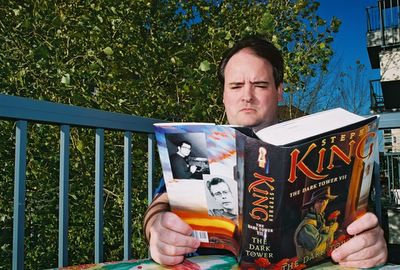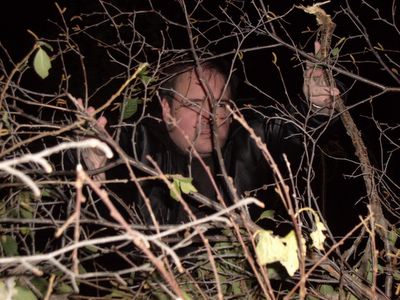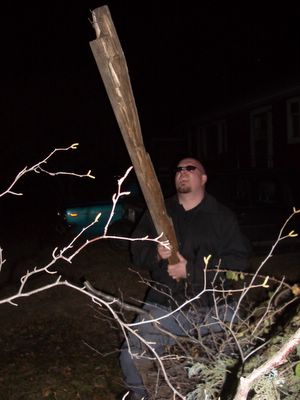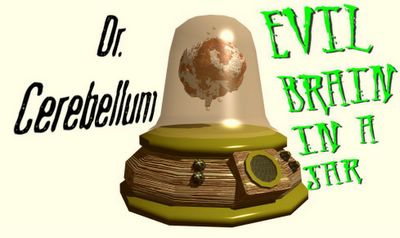
Illustration by Colin Dunn
Prologue: The Long, Long Night of Dr. Cerebellum
One day on a beach in the south of France, Philippe Gagnon dug up a supervillain.
Of course, he didn’t know it was a supervillain. His metal detector beeped; Philippe dug; and so sealed his fate.
“Mon Dieu! C'est un cerveau dans une fiole!*” he gasped, brushing wet sand off the artifact as he knelt beside his find. It was about 30 cm tall, and perhaps half that in width. The bizarre find consisted of a glass dome mounted on a stand of ornately carved wood, inlaid with bronze finishing, a number of buttons and lights, and a speaker grille. The dome was filled with a bubbling amber fluid. A brain floated inside the amber, bobbing gently with any movement of the jar.
“Macabre!” said Gagnon's companion, a lovely filly called Mignon. She leaned over Philippe's shoulders, eyes wide.
Before either could speak again, a stygian darkness enveloped the couple and their grotesque treasure. From the dome came a voice, harsh with static, speaking words they did not understand:
"I LIVE!"
*”My God! It is a brain in a jar!”
Chapter 1: Diminished Expectations
In a lavishly furnished office deep beneath the streets of Paris, lacquered fingernails, blood red, scraped silently across the smooth curve of a glass jar mounted on a pedestal of oak and brass. The disembodied brain of Dr. Cerebellum floated within, bobbing gently in a tiny sea of amber nutrient fluid.
"Don't torture me with a touch I cannot feel," said Dr. Cerebellum, his voice hissing from the speaker grille fixed at the base of his jar. Strumpet, his assistant, obediently pulled her hand away. How she ached to penetrate the glass wall that denied her fingers, her lips, the chance to brush against her idol's glorious brain! One day, she thought, you will feel the naked caress of my body against your living brain, my love. You deny the pleasures of the flesh, lost to you so many decades gone...but I will show you what you have forgotten...I will...
"Strumpet," Dr. Cerebellum said, "Dr. Verlucci will arrive soon. Is Dolt ready?"
Strumpet shook herself from her reverie, her blonde curls dancing upon her shoulders. "Of course, Doctor."
A metallic chuckle echoed from the speaker grille. "Good. With Verlucci out of the way, I'll be able to seize control of his entire organization. With the Minions of C.H.A.O.S. at my command, none shall stand before me!"
Suddenly, Dr. Cerebellum's slightly less competent lackey, Dolt, burst in through the door.
"He's here, sir!" Dolt shouted breathlessly, needlessly waving his arms over his head.
"Send him in, Dolt." Dolt nodded enthusiastically and retreated.
A moment later, Dr. Verlucci, self-styled Cardinal of Crime, hobbled into the office, leaning heavily on a steel walker. His aged countenance was fissured by decades of bitter spite, his spine twisted with a century's worth of vitriol. Strumpet moved to help the old man to a seat, but the venerable villain waved her off.
"Keep away from me, you tart!" he bellowed. "I'm not so old that I can't stand for the few seconds this meeting will take."
Strumpet hid her anger behind a sweetly professional smile. "Of course, Doctor."
"What's this all about, Cerebellum? I'm a busy man - got Paladins of O.R.D.E.R. to kill - trains to derail - candy to take from babies!"
"My dear fellow," replied Dr. Cerebellum, "I sympathize. Evil is a harsh, demanding mistress, and there are only so many vile deeds one can perform in a day."
"Get on with it, you freakish small-timer!"
"Very well. I'll make it plain: I wish to assume command of the Minions."
Dr. Verlucci cackled. "You? A helpless brain in a jar? A ghoulish monstrosity straight out of a drive-in movie? Fool! Commanding the Minions requires a towering intellect...a fiendish capacity for depravity...a complete inability to feel remorse or compassion! Not to mention an able body! You delude yourself, Doctor! And worse - you have wasted my time. Do not think you can escape punishment for this affront."
"Your response was not unexpected, Doctor Verlucci. I had hoped that you would be more...reasonable. Dolt," Dr. Cerebellum continued, "You may proceed."
Dolt returned, a small blue pistol clenched in his right hand.
"What's this?" Verlucci snorted. "You can't kill me, you fool. You'll have a horde of Minions on you faster than you can blink. Well, faster than you could blink if you had eyes."
Strumpet grinned evilly as her master's voice boomed from the speaker grille. "My dear Doctor! You overestimate the loyalty of your Minions! Who do you think asked me to arrange this meeting? Only your most dedicated lieutenants! Ha ha ha ha ha!"
Dr. Verlucci gaped. "But...Albertolini...Soggy Belly..? They would never betray me!"
Verlucci couldn't take his eyes from the barrel of Dolt's weapon. He began to realize he'd made a critical error, and raised his hands in feeble supplication.
"No...don't!"
"Now, Dolt," said Dr. Cerebellum.
Dolt pulled the trigger. A green glow enveloped Dr. Verlucci, then faded. The mad scientist blinked. "What have you done to me?" he whispered.
"Dolt has just tested my newest invention: the C.H.A.O.S. Gun. That is, the Collapse His Atoms, Or Shrink, Gun. A 'small-timer,' am I? Well, Dr. Verlucci, soon you will be the small-timer...literally!"
Dr. Cerebellum and his henchmen broke into unrestrained, diabolical laughter. Dr. Verlucci's stature began to diminish, clothes, walker, and all, his voice shrinking in tandem.
"You'll pay for this, Cerebellum! You'll...payyyyyy..."
But when Verlucci shrank to a mere five centimeters in height, Strumpet raised her right foot and then brought it down upon his shrunken head, crushing him like a bug. A grisly pool of blood and gristle spread across the carpet.
"Ewwwww," Dolt moaned, clutching his stomach. "I - I think I'm going to puke!"
Strumpet made a low, mewling sound of pleasure as she ground Dr. Verlucci's remains into the floor. A rapturous smile lit up her beautiful features.
"Well done, my dear. I'd say you've crushed all his dreams and aspirations. Ha ha ha! Dolt, clean up the mess."
"Yes, sir," Dolt replied glumly.
Strumpet kicked off her shoes and collapsed languidly onto the couch, stretching, her lithe form arching. "You've done it, Doctor," she cooed.
"Hmph. Yes. But this is only the beginning. With my hold on the Minions consolidated, all that remains between me and world domination are those idealistic fools, the Paladins of O.R.D.E.R. Once Alter Ego and his band of stooges are destroyed, I shall at long last realize my mad dream of conquest."
"Will you use the shrink ray on them? I'd love to crush those sanctimonious Paladins beneath my heels..."
Dr. Cerebellum's artificial voice box simulated a derisive snort. "Bah. Perhaps. But a simple shrinking death is too quick for them. Their demises must be more fiendish, more diabolical. As for the shrink ray - I shall use it to shrink beautiful women, who I will then put in birdcages for my amusement. Ha ha ha!"
Strumpet couldn't help herself; she rushed up to Dr. Cerebellum's jar and planted a kiss at its apex, leaving a greasy smear of lipstick.
"Oh, really, Strumpet. I wish you wouldn't do that. It's so undignified."
The Adventures of Dr. Cerebellum, Evil Brain in a Jar, Chapter 2: Minute by Minute
The dank catacombs beneath the Paris Opera House dripped with slime, a dark reflection of the glittering City of Lights above. Through this maze of grime and scum skulked Big Jim Spittolini, thug for hire, and his reluctant companion, Shrieking Groaner, smalltime supervillain.
"I can't believe I'm walking in this stuff," Shrieking Groaner said with a groan. His official supervillain boots, once a shiny red, were caked with nauseating goop.
"Shaddup," Spittolini barked, "We're almost there. I'm sick of your whining, Shrieking Groaner. It's always shrieking over this, groaning over that! Why, I've got half a mind to plug you right here and leave you for the rats."
Shrieking Groaner shrieked, horrified, his lower lip quivering in fear. Spittolini rolled his eyes and pressed on, rounding a curve to find the doorway to Dr. Cerebellum's Sanctum Sanctorum. "We're here, Groaner. Pull yourself together - time to meet the new boss."
Spittolini pushed open the door and blinked at what he saw – a sumptuous anteroom, far better than the digs Dr. Verlucci had enjoyed. Disembodied brain or not, Dr. Cerebellum evidently had taste.
Dolt, one of Cerebellum’s personal assistants, rose from behind his desk to greet Spittolini and Groaner.
“If you’ll come this way, gentlemen,” Dolt said, ushering them through a set of oak double doors and into Dr. Cerebellum’s offices. The sinister brain in a jar was there, along with his associate, Strumpet.
“So – you’ve arrived,” Cerebellum said.
“We’re here,” Spittolini replied. “So is the job done?”
Strumpet said, “Dolt washed Dr. Verlucci's remains down the drain a few minutes ago. The remains of his brains flow mainly down the drains! Ha ha ha!”
Spittolini nodded. “And our money?”
“Deposited into your Swiss accounts, as agreed. I assume that along with your loyalty, I’ve bought your friends?”
“Yeah, yeah. Verlucci wasn’t that popular, trust me. If you can deliver the goods – wealth, power, and sex – then you won’t get any trouble from any of the Minions.”
“We’re easy to please!” said Shrieking Groaner, barely suppressing a shriek of delight and a groan of ecstasy.
“Excellent. Now then – doubtless you’re wondering just how I plan to lure the Paladins to their doom.”
"It had crossed our minds," Spittolini replied laconically.
"It's simple. We'll take a stroll and shrink the Eiffel Tower. Then, when the Paladins show up to investigate, we'll shrink them, too."
Strumpet said, "But boss, I thought you were only going to use the shrink gun to shrink beautiful women and put them in birdcages."
"You have a shrink gun?" Spittolini interrupted. Verlucci ignored him.
"I changed my mind. When you crushed Dr. Verlucci beneath your spike heel, Strumpet, it aroused…feelings…that I haven't experienced for quite some time. To see that do-gooder Alter Ego crushed in a similar fashion would bring me great satisfaction."
"When do you intend to carry out this plan?" Spittolini asked.
"Immediately," the mad brain replied, "And you, Mr. Spittolini, will play a very important role. Strumpet, if you please…"
Strumpet took Dr. Cerebellum into her arms and lifted the jar off its pedestal. She raised the jar high, and as Big Jim gaped, she carefully planted it on his head. Before Spittolini could react, a series of clamps snapped out of the bottom of Dr. Cerebellum's base and tightened around the shocked gangster's skull.
"OW! What the hell is this?" he cried, reaching up instinctively to try to pull the brain in a jar from his head. It was no use; the jar was clamped on tight.
"Don't worry, Spittolini. The clamps aren't tight enough to cause any lasting damage, though they may give you a bit of a headache. I assure you that I won't put any undue pressure on your brain."
"It feels like my head is stuck in a vise!" Spittolini complained. "What the hell are you planning?"
"My unusual appearance means that I would draw undue attention were I to prowl the streets of Paris without some form of disguise. You, my dear fellow, will serve as part of that disguise. Strumpet, the hat, if you would."
Strumpet opened a closet and produced a tall, black, stovepipe hat. She approached Spittolini and the doctor and pulled the stovepipe over Dr. Cerebellum’s environmental jar. The doctor’s voice was muffled by the hat, but still audible: "I call it the C.H.A.O.S. hat - for 'Cleverly Hide All Obvious Synapses,’” he explained.
“Why do all our evil inventions and operations have to have some clunky C.H.A.O.S. anagram?” Strumpet grumbled. “’Change Height At Once Steroid,’ ‘Create Hideous And Odious Stench,’ ‘Conjure Ham And Onion Sandwich…’ Besides, it’s just a hat, for God’s sake, not some brilliant technological wonder.”
“You’re an effective operative, Strumpet, but you should cultivate your appreciation for Minion traditions. Dr. Verlucci was an overconfident fool, but he had a flair for villainy.”
"This is going to put one hell of a kink in my neck," Spittolini said, "How much does your stupid jar weigh?"
"Well, the total weight of my brain, the jar, the nutrient fluid, and the base puts me at a svelte 45 kilograms."
Spittolini groaned.
* * *
Some hours later, Dr. Cerebellum and a hand-picked (or brain-picked, since Cerebellum had no hands) team of Minions of CHAOS emerged from a manhole, blinking in the bright sunlight. They were a fearsome group: The rugged Spittolini and his disguised master, Cerebellum; the fatal femme, Strumpet; the oafish but obedient Dolt; and Shrieking Groaner, clutching in one hand the innocent-looking but cataclysmic Calamity Bagel. The Eiffel Tower waited heedlessly in the distance.
"Don't we need more agents than this if we're going to take on a team of Paladins? We don't know how many of their agents could show up, or which ones," Spittolini said. Shrieking Groaner agreed with a quiet, mournful groan.
"Bah! You display all the foresight and cunning of your erstwhile leader—which is to say, none. Whenever a crisis alert comes in to Paladin HQ, Alter Ego or one of his lieutenants sends in a recon team, usually composed of a small group of key agents: Naked Singularity, because of her ability to provide instantaneous transport to the scene, Bottle Dropper, because of his experience and keen observational skills, and Alter Ego himself, because he has an irrational credo about not sending his agents in where he won't go, etcetera ad nauseum. Alter Ego usually keeps his heavy hitters in reserve, so there's very little chance we need to worry about powerhouses like Paramount Importance or Dolt Man (no relation to Dolt)."
"I'm not related to Dolt Man!" said Dolt.
"Dolt, I already said the disclaimer," sighed Dr. Cerebellum, voice muffled by the CHAOS hat.
Just then, a rotund, balding man in a baker's apron came upon the Minions. He pointed and laughed at Spittolini. “C’est Monsieur Lincoln! Ha ha ha! Dans le grand chapeau!”
Spittolini grimaced. "I may not know how to speak French, but that guy is putting himself in Dutch with me! Hey, buddy - how'd you like a knuckle sandwich? With extra ketchup?"
"Fool!" Cerebellum barked within his hat, "No French chef worth his salt would sully a sandwich with ketchup!"
"But I like ketchup," Dolt whined.
"Silence! I tire of this idiotic banter. Shrink the tower and draw those putrid Paladins to their atomic doom!"
Strumpet raised the CHAOS gun, its barrel aimed directly at the iconic tower. With a squeeze of the trigger, she bathed the structure in weird green light, and the tower began to diminish. Cries of anguish rose from the streets of Paris:
"Quelle dommage! Le tour c'est petite!"
"Mon dieu! Je pense que je vous vomir!"
"Mon chapeau c'est dans le chateau!"
"Ou est le salle du bain?"
* * *
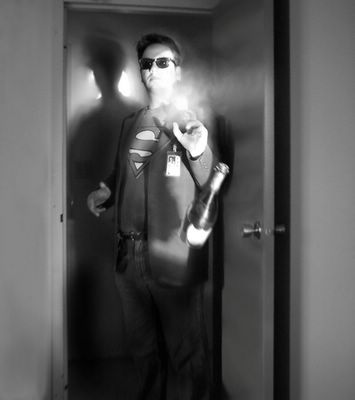
Bottle Dropper, by Jeff Shyluk
Moments later, in the stratospheric headquarters of the Paladins of ORDER, the heroic Bottle Dropper nearly dropped his bottle of beer as the Trouble Tingler zapped his plush leather chair, alerting him to activate the MegaScreen. He did so by slamming an open palm against a bright red button, and the gigantic (one might even say ostentatious) viewer hummed to life.
"Holy Smashamoley!" yelped Bottle Dropper. He watched in horror as the Eiffel Tower shrank to the size of one of those novelty Eiffel Tower pencil sharpeners or paperweights you might pick up at a sleazy tourist trap at that one casino in Las Vegas - you know, the one with the half-scale Arc de Triomphe (soon to be shrunk, dear readers; have no fear).
Bottle Dropper knew what he had to do. Pulling on his communications headset, he keyed an emergency alert signal into the computer:
"Calling all Paladins...Calling all Paladins..."
TO BE CONTINUED
